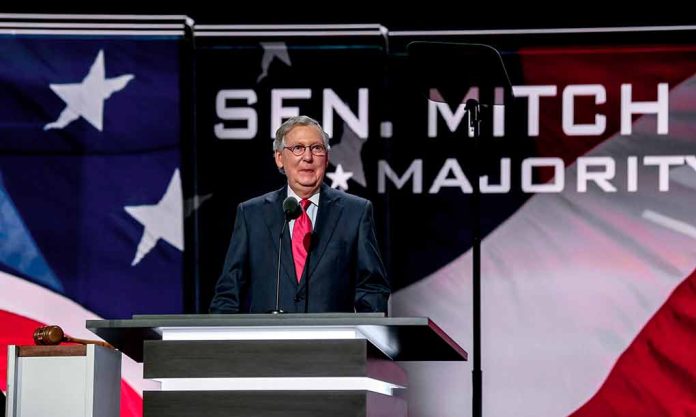
Tulsi Gabbard, a former Democratic congresswoman from Hawaii, has been confirmed as the new Director of National Intelligence in a tight 52-48 Senate vote, sparking controversy and debate across party lines.
Key Takeaways
- Tulsi Gabbard confirmed as Director of National Intelligence in a close 52-48 Senate vote
- Mitch McConnell was the only Republican senator to vote against Gabbard’s confirmation
- Gabbard’s lack of intelligence experience and past controversial stances raised concerns
- Democrats opposed her nomination, while most Republicans were swayed by her commitment to refocus the agency
- Gabbard faces challenges in overcoming skepticism and building trust within the intelligence community
Senate Confirmation and Party Divide
The Senate has confirmed Tulsi Gabbard as President Donald Trump’s new Director of National Intelligence in a closely contested vote of 52-48. The confirmation process was marked by intense partisan debate, with Republicans largely supporting Gabbard’s nomination while Democrats remained staunchly opposed. Notably, Senate Minority Leader Mitch McConnell broke ranks with his party, becoming the sole Republican to vote against Gabbard’s appointment.
Gabbard, a military veteran and former Democratic congresswoman from Hawaii, faced significant scrutiny during the confirmation process. Her lack of formal intelligence experience and controversial past stances on issues such as Russia, Syria, and Edward Snowden were major points of contention.
Tulsi Gabbard confirmed as Director of National Intelligence in a 52-48 vote.
The only Republican who voted no was Mitch McConnell. pic.twitter.com/RdfOyUg909
— Libs of TikTok (@libsoftiktok) February 12, 2025
Concerns and Criticisms
Democrats and some national security experts expressed serious reservations about Gabbard’s qualifications for the role. Senate Democratic leader Chuck Schumer of New York voiced his opposition, stating, “We simply cannot in good conscience trust our most classified secrets to someone who echoes Russian propaganda and falls for conspiracy theories”
McConnell, in explaining his vote against Gabbard, emphasized the potential risks associated with her appointment saying, “The nation should not have to worry that the intelligence assessments the President receives are tainted by a Director of National Intelligence with a history of alarming lapses in judgment. Entrusting the coordination of the intelligence community to someone who struggles to acknowledge these facts is an unnecessary risk.”
Adding to the controversy, nearly 100 former national security officers warned about Gabbard’s lack of experience for the role. Her past actions, including meeting with Syrian President Bashar al-Assad and her defense of whistleblower Edward Snowden, were also scrutinized during the confirmation process.
Republican Support and Gabbard’s Commitment
Despite initial hesitation, most Republican senators ultimately supported Gabbard’s nomination. Her commitment to refocus the intelligence community in line with President Trump’s vision played a crucial role in securing GOP backing. Senator Lisa Murkowski of Alaska expressed this sentiment, “While I continue to have concerns about certain positions she has previously taken, I appreciate her commitment to rein in the outsized scope of the agency”
Gabbard’s nomination gained momentum with support from Trump’s base and influential figures like Elon Musk. During her swearing-in ceremony, President Trump praised Gabbard as a “courageous and often lonely voice,” highlighting her unconventional political journey from the Democratic Party to a key position in his administration.
Challenges Ahead
As Gabbard assumes her role as Director of National Intelligence, she faces significant challenges. Her lack of formal intelligence experience and the controversy surrounding her appointment may pose obstacles in building trust within the intelligence community. Gabbard will need to navigate these challenges while working to ensure cohesive and efficient security operations.
The Office of the Director of National Intelligence, created in the aftermath of the 9/11 attacks to address intelligence failures, now finds itself at a critical juncture. Gabbard’s leadership will be closely watched as she attempts to refocus the agency and address concerns about its politicization, all while maintaining the delicate balance of national security interests and intelligence sharing with allies.
Sources:
Senate confirms Gabbard as Trump’s director of national intelligence after Republicans fall in line
Mitch McConnell Explains His Sad Lone “No” Vote on Tulsi Gabbard
Welcome to the resistance? Mitch McConnell bucks Trump with ‘no’ votes.







